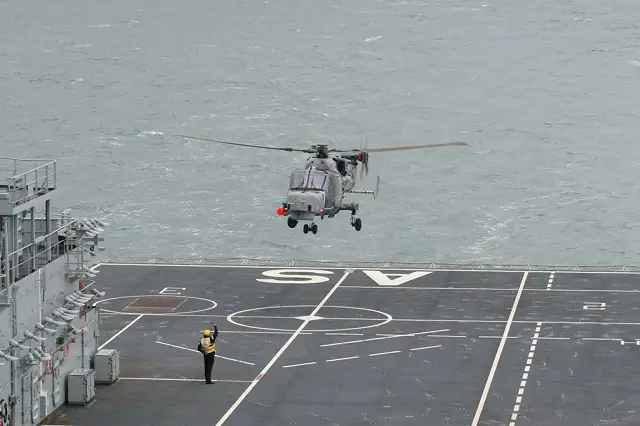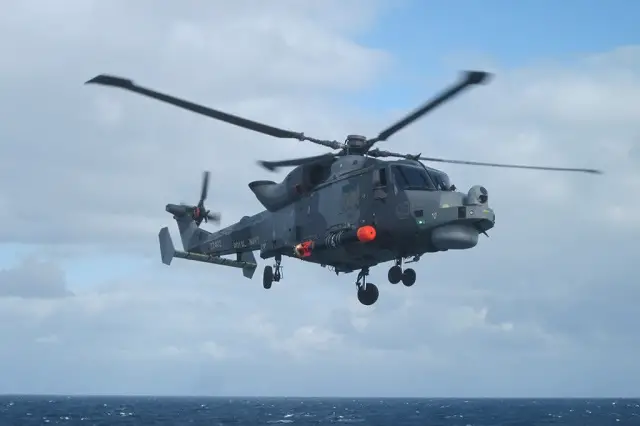Breaking news
Royal Navy AW159 Wildcat joins RFA Argus Aviation Training & Casuality Ship at sea for trials.
| 2013
| |
|||
| a | |||
Naval
Forces News - UK |
|||
| Royal Navy AW159 Wildcat joins RFA Argus Aviation Training & Casuality Ship at sea for trials | |||
A
special trials version of Wildcat – replacement for the trusty
Lynx which has been in service since the 1970s – has joined aviation
training/casualty treatment ship RFA Argus to gather crucial data to
allow the helicopter fly from large Royal Navy warships. Wildcat will
spend the bulk of its time operating from Royal Navy frigates and destroyers
– just like its predecessor. |
|||
 AW159 Wildcat onboard RFA Argus Aviation Training and Casualty Receiving Ship of the Royal Fleet Auxiliary Service. Picture: Royal Navy |
|||
But it
will also be expected to fly on and off the flight deck of larger vessels:
helicopter and aircraft carriers such as HMS Ocean and Queen Elizabeth,
assault ships such as HMS Bulwark, and Argus herself. The characteristics of these bigger ships – such as the wind speed across the deck and the vessel’s motion – are entirely different, so trailblazers must set the limits at which ship and helicopter can safely operate. Which is exactly what Argus and her trials version of Wildcat – equipped with extensive additional sensors and instrumentation – is doing for the next month in the Western Approaches and Irish Sea. A 39-strong test team – a mix of military and civilian personnel from the helicopter’s manufacturer AgustaWestland, the Rotary Wing Test and Evaluation Squadron Boscombe Down, 700W Naval Air Squadron from RNAS Yeovilton (which is helping to introduce Wildcat to front-line service) and the Lynx Project Team – have joined Argus for the trials. |
|||
 AW159 Wildcat. Picture: Royal Navy |
|||
Thanks
to its role as an aviation training ship over the past 30 years, Argus
is well used to such trials – and the information gathered can
be extrapolated to other large ships and even other aircraft types. “The trial is a huge team effort – test pilots from AgustaWestland and from Boscombe Down are sharing the flying and assessing the degree of difficulty for each deck landing and take-off,” explains Lt Cdr Rob Dowdell, the lead test pilot the from Rotary Wing Test and Evaluation Squadron. “Maintainers from 700W squadron are spreading and folding the Wildcat and acting as refuelling and lashing numbers, Argus’ aircraft handlers and the ship bridge and Flying Control team are providing the required deck conditions under the direction of civilian experts from QinetiQ at Boscombe Down.” After flying, engineers from AgustaWestland are servicing the Wildcat, checking the instrumentation and preparing it for the next day’s sorties, while the firm’s stress experts are ensuring no design limitations are being encroached by analysing the masses of data collected by the trials equipment fitted to the helicopter. Scientists from QinetiQ have also provided instruments to record the ship’s motion and wind conditions, with the data analysed by the team to ensure the tests are safe. At the same time the ship’s company were gathering their own data, information and tips on aircraft movements and ground power supplies. “The embarkation of the Wildcat has given the ship’s company a chance to experience the future of Naval aviation at first hand – and also to test the ships’ aviation facilities to ensure they are ‘future-proof’,” said Lt Cdr Mo Morris, the Argus’ Senior Naval Officer. Lt Cdr Dowdell added: “The ship’s crew have provided all the essential support to allow Argus to be deployed from anywhere from north of Scotland to the Canary Isles to ensure the correct meteorological conditions are achieved. “Finding the right weather for testing is crucial with the perfect mix of wind speed, temperature, air pressure and sea state being critical to gathering the right quality data that will allow future global Wildcat deployments.” The trials are due to finish on November 7, after which a comprehensive report will be compiled documenting all the new limitations and lessons learned. Link to AgustaWestland AW159 multi-role maritime helicopter technical datasheet |



















